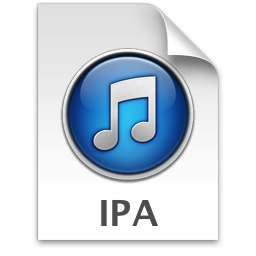|
The iPhone Wiki is no longer updated. Visit this article on The Apple Wiki for current information. |
Difference between revisions of "IPA File Format"
(clarification) |
m |
||
| Line 24: | Line 24: | ||
# Create a folder named <code>Payload</code> |
# Create a folder named <code>Payload</code> |
||
# Place your <code>.app</code> folder in it |
# Place your <code>.app</code> folder in it |
||
| − | # Create a 512x512 JPEG version of your icon |
+ | # Create a 512x512 JPEG version of your icon (see [[#iTunesArtwork|above section]]) |
# Save it as <code>iTunesArtwork</code> (no extension) |
# Save it as <code>iTunesArtwork</code> (no extension) |
||
# Create your <code>[[iTunesMetadata.plist]]</code> and save it |
# Create your <code>[[iTunesMetadata.plist]]</code> and save it |
||
Revision as of 00:06, 23 March 2013

An IPA archive is the de facto way to package applications for iOS. The extension has no official definition, but is commonly called iPhone Application by the iOS community. The file is just a renamed ZIP archive. Although any computer with a ZIP archive reader can extract an IPA, PNG images (e.g. the app's icon files) are typically in a proprietary variant of the PNG format instead of the standardized PNG format, and the application binary is encrypted (DRM) which prevents examination of the binary.
Contents
As an IPA file is just a renamed ZIP archive, its structure is available from PKWARE.
iTunesArtworkiTunesMetadata.plistPayload/{ApplicationName}.app/- (various application files)
iTunesArtwork
As per Technical Q&A QA1686, the iTunesArtwork file should be a PNG image. However, Apple, among many other developers, contradict this by using JPEGs instead.
Examination of nearly any iTunesArtwork file with a hex editor can be used to confirm this. If the file's first two bytes are ff d8 (hex), the file is a JPEG. If the first 8 bytes are 89 50 4e 47 0d 0a 1a 0a (hex), the file is a PNG.
Usage
Apple uses the IPA format for packaging iOS aplications. iTunes can be used to install their contents on a device, provided the included files are signed. Developers can use the IPA format for Ad Hoc Distribution of their apps.
Creation
IPA files are typically created through Xcode, but may be created manually:
- Build application
- Locate the
.appfolder - Create a folder named
Payload - Place your
.appfolder in it - Create a 512x512 JPEG version of your icon (see above section)
- Save it as
iTunesArtwork(no extension) - Create your
iTunesMetadata.plistand save it - "ZIP" the contents
iTunesArtworkiTunesMetadata.plistPayload/
See Also
External Links
- Apple Question & Answers QA1686 - App Icons on iPad and iPhone